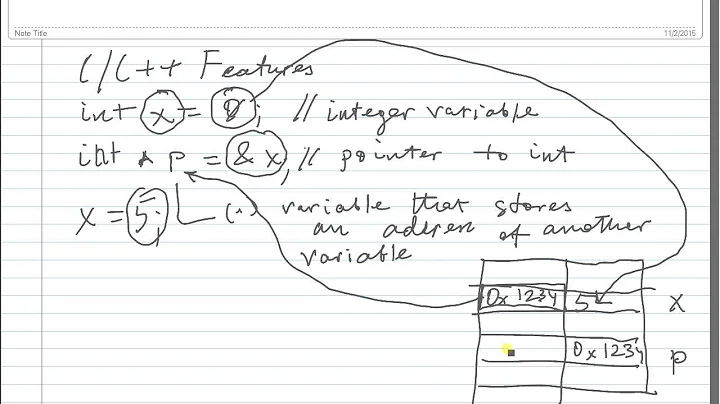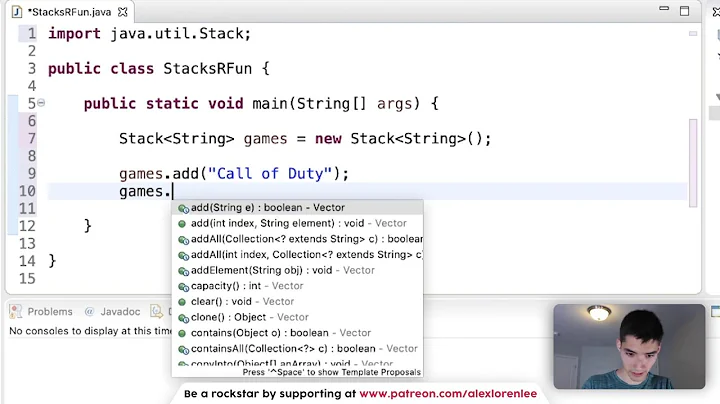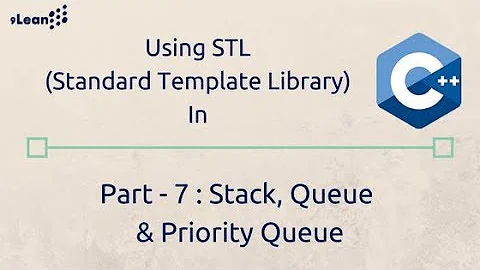how to print out all elements in a std::stack or std::queue conveniently
Solution 1
I've written a snippet to do that for debugging. For example:
std::stack<int> s; // works with std::queue also!
s.push(1);
s.push(2);
std::cout << s; // [ 1, 2 ]
Please forgive me for this hackish code! but this is what I've written months ago:
#include <stack>
#include <queue>
#include <ostream>
template <class Container, class Stream>
Stream& printOneValueContainer
(Stream& outputstream, const Container& container)
{
typename Container::const_iterator beg = container.begin();
outputstream << "[";
while(beg != container.end())
{
outputstream << " " << *beg++;
}
outputstream << " ]";
return outputstream;
}
template < class Type, class Container >
const Container& container
(const std::stack<Type, Container>& stack)
{
struct HackedStack : private std::stack<Type, Container>
{
static const Container& container
(const std::stack<Type, Container>& stack)
{
return stack.*&HackedStack::c;
}
};
return HackedStack::container(stack);
}
template < class Type, class Container >
const Container& container
(const std::queue<Type, Container>& queue)
{
struct HackedQueue : private std::queue<Type, Container>
{
static const Container& container
(const std::queue<Type, Container>& queue)
{
return queue.*&HackedQueue::c;
}
};
return HackedQueue::container(queue);
}
template
< class Type
, template <class Type, class Container = std::deque<Type> > class Adapter
, class Stream
>
Stream& operator<<
(Stream& outputstream, const Adapter<Type>& adapter)
{
return printOneValueContainer(outputstream, container(adapter));
}
You can stream std::stack and std::queue just like any other supported type!
Solution 2
You can't iterate through a stack or a queue. In fact, SGI's documentation says this (it's about stack, but it's the same reason for queue):
This restriction is the only reason for stack to exist at all. Note that any Front Insertion Sequence or Back Insertion Sequence can be used as a stack; in the case of vector, for example, the stack operations are the member functions back, push_back, and pop_back. The only reason to use the container adaptor stack instead is to make it clear that you are performing only stack operations, and no other operations.
So, if you really want to do this, you'll have to empty the stack (or queue):
std::stack<Whatever> s;
// ...
while(!s.empty())
{
Whatever w = s.top();
std::cout << w;
s.pop();
}
Solution 3
ostream & operator<<(ostream & os, stack<double> my_stack) //function header
{
while(!my_stack.empty()) //body
{
os << my_stack.top() << " ";
my_stack.pop();
}
return os; // end of function
}
/*
using this simple overloaded operator function, you're able to print out all the components of a stack by doing a simple cout << your_stack_name;*/
Solution 4
Posting b/c I found this useful for debugging. Pop from original into a temp and then pop from temp back into original:
template <typename T>
void dump_stack(std::stack<T>& stack) {
std::stack<T> temp;
while (!stack.empty()) {
T top = stack.top(); stack.pop();
std::cout << top << " ";
temp.push(top);
}
while (!temp.empty()) {
T top = temp.top(); temp.pop();
stack.push(top);
}
}
Solution 5
It can be easily done using recursion you just need to know when to re-add the next element
For Stack
void print(stack<char> &s)
{
if(s.empty())
{
cout << endl;
return;
}
char x= s.top();
s.pop();
print(s);
s.push(x);
cout << x << " ";
}
And this one is For Queue
void print(queue<char> &s,int num)
{
if(!num)
{
cout << endl;
return;
}
char x= s.front();
s.pop();
cout << x << " ";
s.push(x);
print(s,--num);
}
Good Luck
Related videos on Youtube
Qiang Li
Updated on July 09, 2022Comments
-
Qiang Li almost 2 years
If I do not to want to create a new container in order to do so?
-
Qiang Li over 13 yearsregarding 1. of course, i do not want only to print out all elements when using the stack or queue.
-
Qiang Li over 13 yearsi don't want to empty it though, unless i made a copy before i do this. Still, i am wondering if there is a better solution. :)
-
Etienne de Martel over 13 yearsThen, use a vector (for a stack) or a deque (for a queue) instead. Stacks and queues are for very specific situations.
-
Khaled Alshaya over 13 yearsThere is no need to mess with the elements, you can get the underlying container with a simple hack. I used the code in my answer for debugging of course.
-
Khaled Alshaya over 13 years@Qiang Li Please check my comment under the question it self where I refer to the original question where I found the solution.
-
Etienne de Martel over 13 yearsI know VC++'s implementation has a public field for the underlying container, but I'm not sure it's portable...
-
Khaled Alshaya over 13 yearsGood note, but the code is actually standard and doesn't depend on a particular implementation. The standard says that the underlying container is
protected! The way this code works is that it inherits std::stack(or std::queue) then it exposes the underlying container. Please, check the comment under the question itself to get an idea. -
Steve Jessop over 13 yearsThis is true of the original STL as SGI developed it, but not true of the standard.
-
Etienne de Martel over 13 yearsInteresting, I didn't know that.
-
Ramakrishnan Kannan almost 8 yearsYou will loose all the elements in the stack.
-
GingerPlusPlus over 7 years@Ramakrishnan: no. He's taking the stack by copy, not by reference.
-
425nesp over 2 yearsNote: Elements will be printed in reverse order in which they were pushed.
-
ramgorur about 2 yearsNot at all, what if I want to see the content of a stack at every step inside a loop during the development?






![[Danh Sách Liên Kết] Bài 15. Cài đặt cấu trúc Stack trong danh sách liên kết](https://i.ytimg.com/vi/MJ4HlKbZqNs/hq720.jpg?sqp=-oaymwEcCNAFEJQDSFXyq4qpAw4IARUAAIhCGAFwAcABBg==&rs=AOn4CLC-nuKcU9SQ-orm8Uluc2bcYyBPeQ)



![Cấu trúc dữ liệu & Giải thuật [13]: Stack And Queue | Ngăn xếp và Hàng đợi](https://i.ytimg.com/vi/Fx1l2jOKbJE/hq720.jpg?sqp=-oaymwEcCNAFEJQDSFXyq4qpAw4IARUAAIhCGAFwAcABBg==&rs=AOn4CLBmPE9wYabYcZBI39Hx5pEfTQc3MQ)